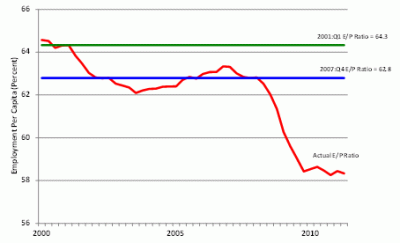September 02, 2011

Source: Robert Gordon
The eminently mainstream economist Robert Gordon has posted a surprisingly hard-hitting paper at the voxeu site. The brief paper estimates that the U.S. economy is currently short about 10 million jobs (14 million using a less conservative estimate –see graph above).
What makes the paper hard-hitting is that Gordon argues a major cause of this enormous employment gap is the increase since the 1980s in “managerial power.” In Gordon’s view, the problem is that “workers are weak and management is strong.”
The weakened bargaining position of workers is explained by the same set of four factors that underlie higher inequality among the bottom 90% of the American income distribution since the 1970s – weaker unions, a lower real minimum wage, competition from imports, and competition from low-skilled immigrants.
Meanwhile, the rise in the importance of stock options as a share of total executive compensation has encouraged managers to come out “with all guns blazing to [cut] every type of costs, laying off employees in unprecedented numbers.”
His econometric analysis suggests that this combination of weaker worker bargaining power and changes in corporate governance have led to a 50 percent higher level of layoffs today for any given decline in aggregate demand. “For every worker tossed overboard in a sinking economy prior to 1986, about 1.5 are now tossed overboard.”
This post originally appeared on John Schmitt’s blog, No Apparent Motive.






